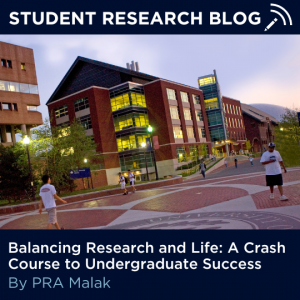By Malak Nechnach, Peer Research Ambassador
 Undergraduate research is an amazing experience that enriches a student’s academic journey, providing opportunities to deepen knowledge, develop critical thinking skills and gain hands-on experience in a chosen field. However balancing research commitments with academic coursework and other commitments can be very challenging. Effective time management, setting clear priorities and fostering a supportive environment is essential for maintaining academic excellence while engaging in research.
Undergraduate research is an amazing experience that enriches a student’s academic journey, providing opportunities to deepen knowledge, develop critical thinking skills and gain hands-on experience in a chosen field. However balancing research commitments with academic coursework and other commitments can be very challenging. Effective time management, setting clear priorities and fostering a supportive environment is essential for maintaining academic excellence while engaging in research.
Last semester proved to be very difficult for me to balance research with my other commitments. I realized I had to sacrifice something to be able to accommodate to my schedule, and usually that sacrifice was time and mental health. Although I loved my lab, I was not able to manage my time successfully and quickly felt drained in work. I believe this is an issue that a lot of undergraduate’s encounters once they start dedicating six, ten to twelve hours a week to research, which is why I hope my advice will help!
The first goal when joining a lab is to set clear priorities. Understanding your personal academic and research goals is essential in maintaining a balance between the two. Some students pursue research as a means to explore future career opportunities, while others may see it as a complement to their academic coursework. By identifying the purpose of engaging in research, you can make informed decisions about how much time and energy to dedicate to it and communicate clearly what your goals are. Having this first reflection with yourself helps to open communication with faculty mentors and academic advisors that can provide guidance on managing responsibilities.
Additionally effective time management is one of the most crucial aspects of balancing research and academics. Undergraduate students often have rigorous class schedules, assignments, and exams, making it vital to allocate time strategically. Utilizing tools such as planners and digital calendars where all of your commitments are clearly pictures, can help keep track of the chaos. Setting realistic goals and breaking larger tasks into smaller, manageable steps allows students to stay on track without feeling overwhelmed. Moreover, prioritizing tasks based on urgency and importance can prevent last-minute stress, when you cannot allocate time. Most importantly, I know as undergraduates we want to make the best out of our experience in college, but sometimes we have to learn to say no to additional commitments that may disrupt the balance. This is also an important (but scary) skill to develop.
Finally, (in my opinion) the most overlooked advice is to foster a supportive environment. Balancing research, academics, jobs and extracurriculars will get hard, even with the right time management techniques. This is why surrounding oneself with a supportive academic and social network plays a significant role in successfully balancing research and coursework. Engaging with peers who share similar research interests can create a collaborative learning environment, offering mutual support and motivation. Study groups, research teams, and academic organizations can provide additional resources and encouragement. Seeking mentorship from experienced students or faculty members can also help navigate the challenges of undergraduate research. Mentors can offer practical advice on how to manage expectations, cope with setbacks, and make the most of research opportunities while maintaining academic performance. Furthermore, leveraging our university resources such as tutoring centers, writing workshops, and research support programs can enhance productivity. Overall, whether it is a professional resource or your best friend, try to relay and ask help from someone when you feel drained.
In conclusion, balancing research and academics is a challenging but rewarding challenge that requires strategic planning, prioritization, and a strong support system. By managing time effectively, setting clear academic and research goals and fostering supportive relationships, you can maximize your undergraduate experience. Successfully maintaining this balance not only enhances academic performance but will also prepare you for future research opportunities, graduate studies, and professional careers. Time management is a skill you will need for the rest of your life, so it’s best to try mastering it now!
Malak is a junior majoring in Physiology & Neurobiology and minoring in Mathematics. Click here to learn more about Malak.